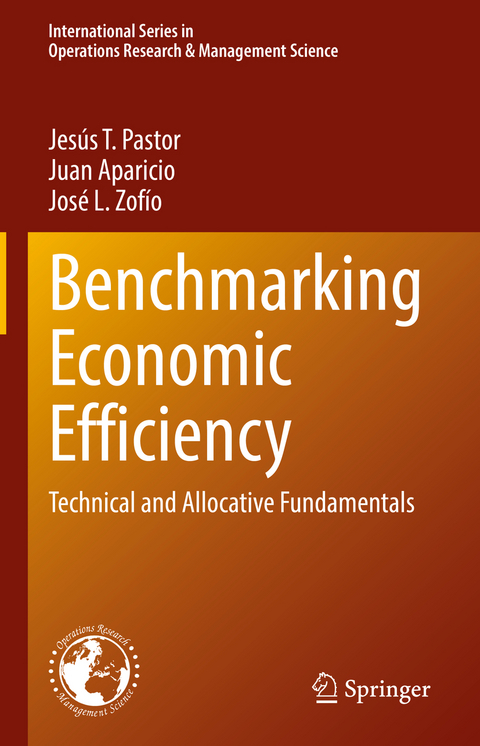
Benchmarking Economic Efficiency
Springer International Publishing (Verlag)
9783030843960 (ISBN)
The book discusses the concept of economic efficiency at the firm level, comparing observed to optimal economic performance, and its decomposition according to technical and allocative criteria. Depending on the underlying technical efficiency measure, economic efficiency can be decomposed multiplicatively or additively. Part I of the book deals with the classic multiplicative approach that decomposes cost and revenue efficiency based on radial distance functions. Subsequently, the book examines how these partial approaches can be expanded to the notion of profitability efficiency, considering both the input and output dimensions of the firm, and relying on the generalized distance function for the measurement of technical efficiency.
Part II is devoted to the recent additive framework related to the decomposition of economic inefficiency defined in terms of cost, revenue, and profit. The book presents economic models for the Russell and enhanced graph Russell measures, the weighted additive distance function, the directional distance function, the modified directional distance function, and the Hölder distance function. Each model is presented in a separate chapter. New approaches that qualify and generalize previous results are also introduced in the last chapters, including the reverse directional distance function and the general direct approach.
The book concludes by highlighting the importance of benchmarking economic efficiency for all business stakeholders and recalling the main conclusions obtained from many years of research on this topic. The book offers different alternatives to measure economic efficiency based on a set of desirable properties and advises on the choice of specific economic efficiency models.
Jesus T. Pastor is a professor of Statistics and Operations Research at the Universidad Miguel Hernandez of Elche, Spain. He has been visiting researcher at the Universities of Georgia (USA), Toronto (Canada), Queensland (Australia) and Warwick (UK). Prof. Pastor's research fields include location science, banking and, for the last twenty-five years, efficiency analysis.
Juan Aparicio is a professor Statistics, Mathematics and Information Technology at the Miguel Hernandez University of Elche (UMH), Spain, and the head of the Center of Operations Research. His research interest includes efficiency and productivity analysis combined with Machine Learning and Data Science. He is associate editor of Omega; The International Journal of Management Science, Journal of Productivity Analysis, Mathematics and Advances in Operations Research.
José Luis Zofío is a professor of Economics at the Universidad Autónoma de Madrid and former Chair of the Department of Economics. He is also Visiting Professor at Erasmus University and Wageningen University and Research, and Visiting Fellow to the Erasmus Research Institute of Management ERIM, where he collaborates with several academics from the Rotterdam School of Management. His research interests are related to measurement theory in economics, in particular the use of index numbers for efficiency and productivity analysis, as well as spatial economics and trade theory.
Chapter 1: Introduction.- Chapter 2: Conceptual background: firms' objectives, decision variables and economic efficiency.- Part I.- Chapter 3: Shephard's input and output distance functions: cost and revenue efficiency decompositions.- Chapter 4: The generalized distance function (GDF): Profitability efficiency decomposition.- Part II.- Chapter 5: The Russell Measures: Economic Inefficiency Decompositions.- Chapter 6: The Weighted Additive Distance Function (WADF): Economic inefficiency decompositions.- Chapter 7: The enhanced Russell graph measure (ERG=SBM): economic inefficiency decompositions.- Chapter 8: The directional distance function (DDF): economic inefficiency decompositions.- Chapter 9: The Hölder distance functions: economic inefficiency decompositions.- Chapter 10: The loss distance function: economic inefficiency decompositions.- Chapter 11: The modified directional distance function (MDDF): economic inefficiency decompositions.- Chapter 12: The reverse directional distance function (RDDF): economic inefficiency decompositions.- Chapter 13: A unifying framework for decomposing economic inefficiency: The general direct approach and the standard and flexible reverse approaches.- Chapter 14: A final overview: economic efficency models and properties.- Bibliography.- Subject Index.- Author Index.
| Erscheinungsdatum | 14.07.2022 |
|---|---|
| Reihe/Serie | International Series in Operations Research & Management Science |
| Zusatzinfo | XXXIV, 640 p. 124 illus., 118 illus. in color. |
| Verlagsort | Cham |
| Sprache | englisch |
| Maße | 155 x 235 mm |
| Gewicht | 1172 g |
| Themenwelt | Wirtschaft ► Allgemeines / Lexika |
| Wirtschaft ► Betriebswirtschaft / Management | |
| Schlagworte | Data Envelopment Analysis (DEA) • Duality theory • Economic Efficiency • Graph Distance Functions • Loss Distance Function • Luenberger indicators • Profitability Change • Profit efficiency • Shephard's Distance Functions • Shephard’s Distance Functions |
| ISBN-13 | 9783030843960 / 9783030843960 |
| Zustand | Neuware |
| Informationen gemäß Produktsicherheitsverordnung (GPSR) | |
| Haben Sie eine Frage zum Produkt? |
aus dem Bereich


